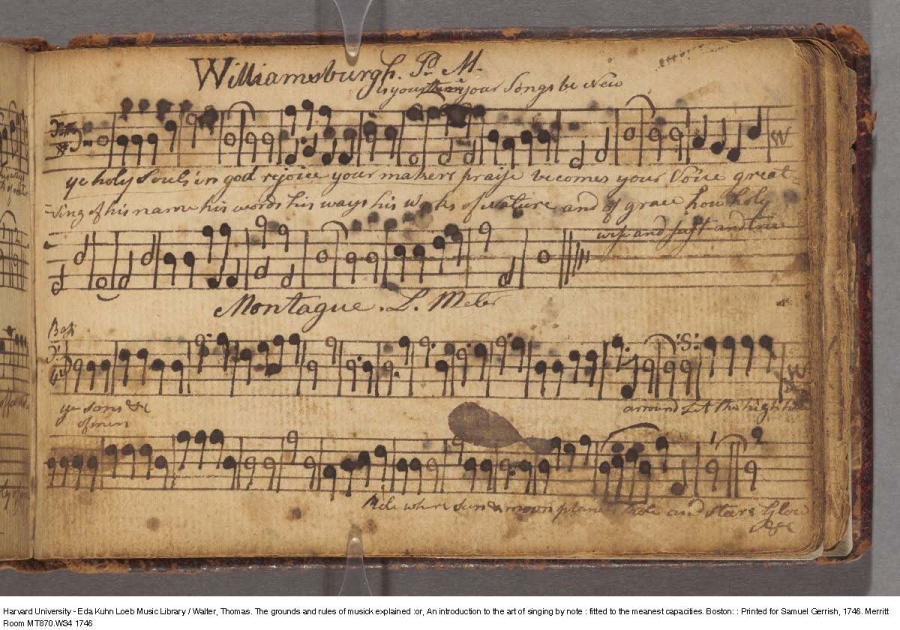Timothy Swan (1758-1842): An Early American Composer
Thursday, July 20, 2017

We might be able to call Timothy Swan one of the first American composers. Born on July 23, 1758, in the British colony of Massachusetts, Swan initially worked as a merchant in his youth and learned the trade of hatmaking. He had very little music training (three weeks of vocal music studies that we know of) and was not exposed to the European traditions of composition and voice-leading in any formal way.
But British tunes were all around him, whether he was hearing them in church congregational singing alongside homegrown New England compositions or in the Continental Army, where as a soldier he learned fife from a British fife player. He might have been able to play the fiddle as well. He tested out his compositions by writing them down and handing them out to his friends, who then sang them and he could hear how they sounded. In this way, manuscripts of Swan’s compositions found rather wide circulation, and in fact once he visited a town to find that his music was known there before it had appeared in print.
The repertory of American psalmody and sacred songs grew rapidly in the late eighteenth century, and Swan’s compositions found their way into printed anthologies even before Swan’s major collections The Songster’s Assistant (ca. 1786) and New England Harmony (1801) were published. “Montague,” which refers to a town in Massachusetts and which Swan once noted was his “oldest tune, 1777,” was first published in a book compiled by John Stickney called The Gentleman and Lady’s Musical Companion in 1783. The popularity of this fuguing tune can be seen by the 60 printings it received by 1810, most of them in New England.
 Timothy Swan, “Montague” (bass only). Eda Kuhn Loeb Music Library, Harvard University (US-CAe), MT870 .W34 1746, seq.143. RISM ID no. 900022685, available online.
Timothy Swan, “Montague” (bass only). Eda Kuhn Loeb Music Library, Harvard University (US-CAe), MT870 .W34 1746, seq.143. RISM ID no. 900022685, available online.
The bass part of “Montague” seen above appears in a section of handwritten music bound to the end of a guide to singing called The grounds and rules of musick explained by Thomas Walter (1746). The volume, now at Harvard University, was owned by Thankfull Hubbard (later Leonard), but this section was probably copied after her death in 1772. Micah Walter imagines that the owner of the book might have copied out his voice part on the basis of a printed copy so that the piece could be performed with friends. From the bass line alone it is difficult to get a sense of the complexity of the piece, which introduces a fugue at the words “Let the high heavens” that continues for the second half of the piece.
The RISM online catalog lists just over 60 entries by Swan, with more of an emphasis on the handwritten circulation of his music rather than the printed. Swan’s manuscripts are today found exclusively in American libraries, mostly in New England where he lived all his life. He continued to compose while keeping his primary occupation as a hatmaker, and died 175 years ago this Sunday—alas, on his birthday—in 1842.
Listen to this performance of “Montague” sung by the Oregon State University Choir from their album “Make a Joyful Noise: American Psalmody, 1770-1840” (1996) and enjoy this uniquely American sound.
Sources:
Nym Cooke, ed., Timothy Swan: Psalmody and Secular Songs (Madison: A-R Editions, 1997).
Richard Crawford, The core repertory of early American psalmody (Madison: A-R Editions, 1983).
Image: Portrait of Swan by an unknown artist, c. 1797. Courtesy of the American Antiquarian Society, Worcester, MA.
Share Tweet EmailCategory: Musical anniversaries

